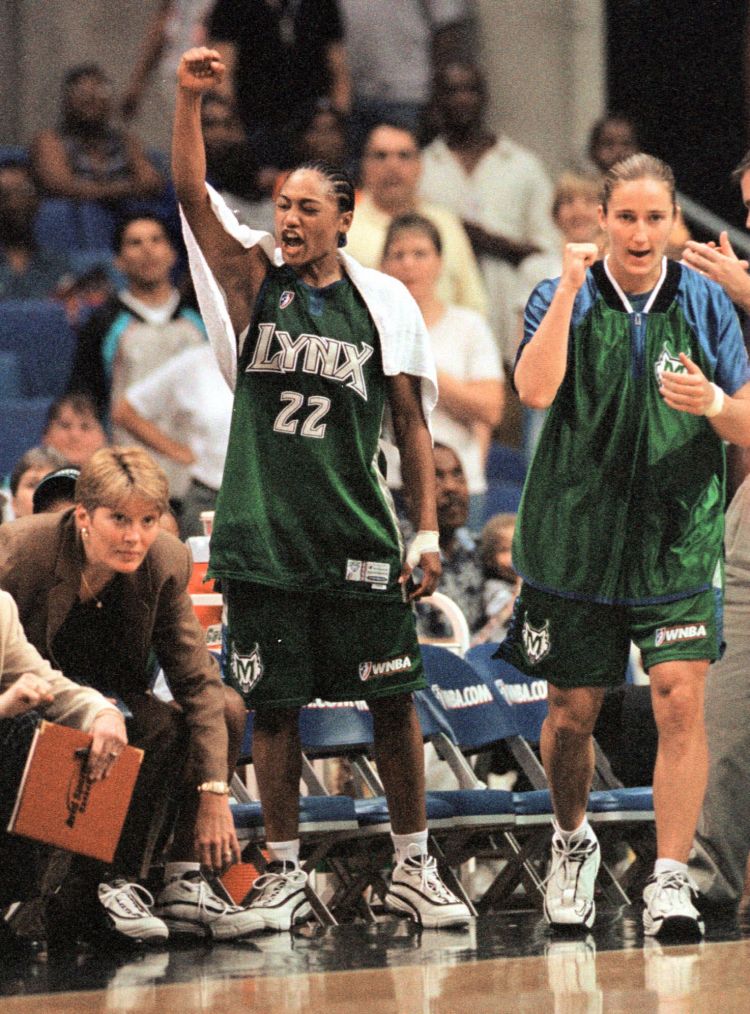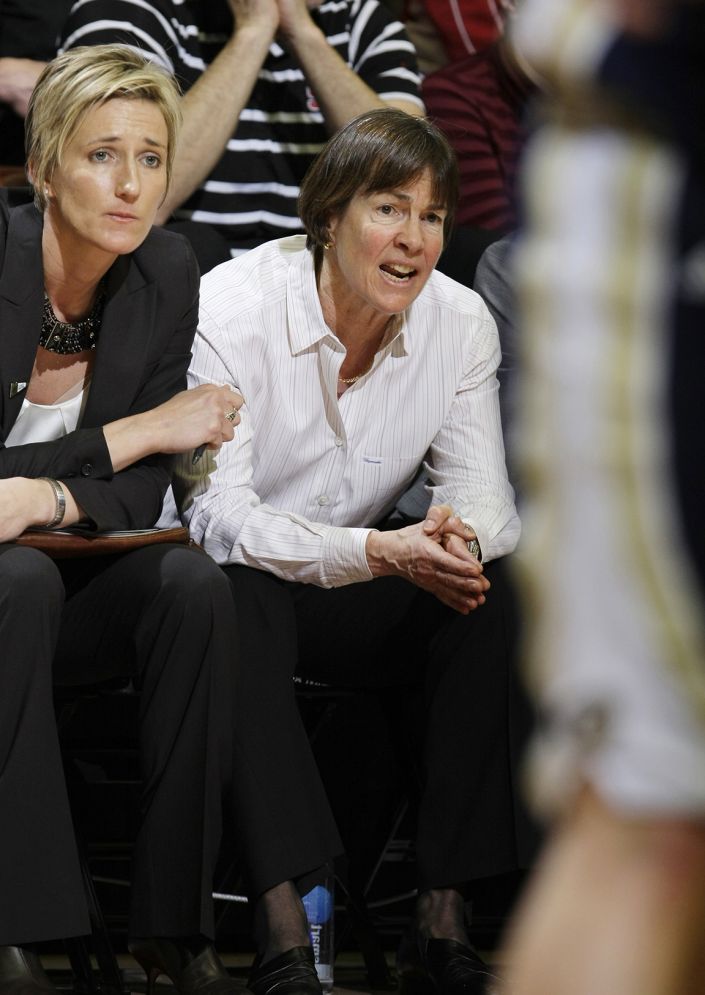In the rapidly changing world of collegiate sports, where lawsuits are transforming the landscape and teams are operating more and more like pro leagues, coaches may need enhanced skill sets that stretch beyond the confines of the court.
Fortunately for the Stanford women’s basketball program, new coach Kate Paye, BA ’95, JD/MBA ’03, comes with unique abilities to meet a moment roiled by name-image-likeness deals, the transfer portal, and a movement to treat athletes as employees. A graduate of Stanford’s joint JD/MBA program, Paye brings an atypical background to her new job as head coach.
“She might need that in this day and age,” says Tara VanDerveer, the legendary coach who turned over the reins to Paye last April after 38 years. “This is a very challenging time, but I think Kate is in the perfect spot.”
Paye, who served as VanDerveer’s assistant for 17 seasons, downplays any edge she may gain due to her advanced degrees.
“I’m not going to give myself that much credit,” she says. “These are very complicated issues, ones that lifetime lawyers are wrestling with.
“I like to think I am able to juggle a lot of things, take in a lot of information, problem solve, and develop a plan for things.”
Developing a plan and choosing a path has long been Paye’s strength.
Paye, who was born at Stanford hospital, was raised on Stanford athletics; her parents were both alumni and her brother John was the Cardinal’s quarterback and a basketball guard. She spent her summers at VanDerveer’s basketball camp.
As a high school basketball player at Menlo School, Paye turned down scholarship offers from other universities, betting on herself and walking on to the Cardinal basketball team.
“Another coach who was recruiting me asked, ‘Don’t you want to go somewhere where you’re wanted?’” Paye remembers. “And I thought to myself, ‘No, I actually don’t care what anybody else wants. I care about what I want.’”
“She’s always been very driven,” says her sister Amy Paye Venuto. “Even as a kid, if she had her heart set on something that’s what was going to happen.”

At Stanford, Paye won a national championship as a freshman and soon earned a scholarship. After graduating in 1995 with an undergraduate degree in political science, Paye played professionally in the American Basketball League, the first pro league to launch after the 1996 Olympic gold medal run by VanDerveer’s U.S. basketball team. But the ABL folded in its third season, under pressure from the competing WNBA, leaving Paye out of a job.
But Paye was already in the process of applying to the JD/MBA program. Her father had a law degree from Hastings and her sister Amy, also a Stanford grad, was at Georgetown Law.
“I was young, and I didn’t know what my next step would be,” Paye says. “The dual program gave me flexibility, and business school was intriguing to me because it was outside my comfort zone.
“I envisioned myself being involved in sports somehow, in business, a front office, as an agent. I certainly didn’t go to law school thinking I’d be a basketball coach.”
But her destiny was, indeed, for a different kind of court.
Paye had already been accepted into the program when the WNBA came calling. Because that league plays in the summer, she was able to go to school fall through spring and wedge her professional playing career into the summer months, sometimes taking exams with a proctor at University of Minnesota, near where she was playing.
“To be able to go to law school and business school and play professional basketball just shows the bandwidth that Kate has,” says VanDerveer.
Paye viewed that time as, “getting to be a college athlete for four more years.” At Stanford Law, she was a driven, dedicated student.
“All these students are very intelligent,” says William B. Gould, IV, who taught Paye in his sports law and labor law class. “But she was very mature, very measured, very deliberate in the way she would discuss an issue or a subject. That really sticks in my mind.”
Paye graduated in 2003, attending her business school ceremony but missing law school graduation due to WNBA training camp in Seattle. But she was waived before the season began, ending her playing career.
“I thought, well, I better use these fancy degrees,” Paye says.
She contacted Cooley Godward, the firm that had offered her summer internships that she had passed over to play ball. The firm was still interested and invited Paye to be part of its incoming class. That summer, she studied for and passed the California bar and by September was in the office, at work as a junior associate.
Her sister Amy, already a corporate attorney, was concerned about her younger sister’s happiness.
“She liked playing basketball for two hours in the middle of the day,” Venuto says. “I was happy to have her close by, but I said, ‘Kate, this doesn’t sound like you.’”
Amy was right.
“The people were great, but by February I was just miserable,” Kate says. “I woke up every morning wondering how I would get through that day.
“Being in an office, being on a computer, wasn’t me. I’m a physical person, I like being active. It just didn’t feel like the right fit.”

Once again, Paye bet on herself. Without anything else lined up and student loans to payback, she resigned to coach college basketball. She contacted everyone she knew in women’s college basketball and soon got a job as an assistant at Pepperdine.
“Kudos to her for figuring it out in six months,” says Amy, who left corporate law when her daughters were young.
VanDerveer agrees.
“Some people spend 50 years doing something they hate,” she says. “Kate figured it out right away.”
After a year at Pepperdine, Paye spent two years at San Diego State. But one day, while she was at the beach, her phone flashed an incoming call from VanDerveer.
“Instantly, I thought, Tara’s calling me to come back,” Paye says. “But to be honest, I wasn’t sure I was going to take the job. I felt that at San Diego State I had impact. And I wondered if, at Stanford, would I make a difference.
“But Tara really impressed upon me that she needed my help.”
Over her years as VanDerveer’s assistant, she was wooed by other schools, moving the athletic department to make her the assistant head coach with the understanding she would take over when VanDerveer retired.
During those years, her bandwidth was on display. She had two children as a single mother. Now Paye is married, and she and her wife Raquel added a third to their family.
“She’s got superpowers,” VanDerveer says.
She may need them. Collegiate sports have transformed since Paye got into coaching.
“It’s a bigger operation, more complicated, more layers, more nuanced,” Paye says. “Fortunately, we have a lot of support at Stanford.”
Some of that support will come with a newly created position. Like many other programs, the Stanford women’s team is in the process of hiring a general manager of sorts: a “director of student-athlete development” to focus on off-court issues.
The flip side of the collegiate turmoil is that women’s sports is having an incredible moment, with booming ratings and surging opportunities for both collegiate basketball and the WNBA.
“It’s incredibly exciting,” Paye says. “It’s very gratifying as someone who has devoted her life to women’s basketball.”
Paye’s sister Amy thinks that Kate would have been an excellent lawyer, if she had devoted her life to that endeavor.
“She would have been great,” Venuto says. “She’s very smart, she’s good at leading a team. As a lawyer, it’s a very similar skill set. You have to be a leader, motivating people, keeping them all on task. But she has her dream job.”
One on a different kind of court.
For more information
This story was originally published by Stanford Law School.